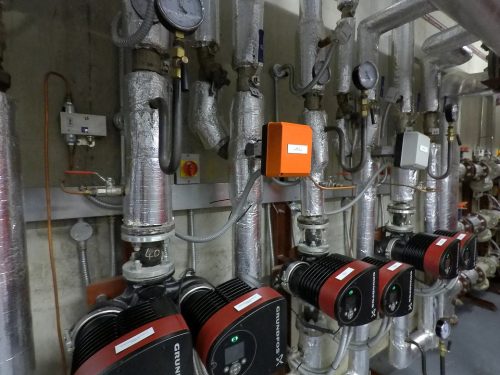Denmark’s power sector decarbonization shows how municipal policies drive district heating—an insight Canada could apply to widen adoption of the efficient, low-carbon heating systems.
“Many will dispute the economic feasibility of district energy in Canada, despite the country having one of the most urbanized populations globally,” said Tonja Leach, executive director of QUEST Canada, a charity supporting community net-zero goals. District heating systems may come with high upfront costs, often paid off over decades, but the same is true for water, sewers, and highways.
“It’s important to recognize that such infrastructure boosts Canada’s overall productivity,” Leach added.
Denmark’s District Heating Leadership
Denmark is a “global frontrunner” for its district heating systems, which are deployed nationwide, writes the Regulatory Assistance Project, in a new report highlighting the country’s successes. The widespread use of district heating there can be attributed to “decades of targeted policy and investment and careful design of the regulatory framework.”
The country integrated district systems into its climate strategy, aiming to cut carbon emissions by 70% across all sectors by 2030, eliminate the direct use of fossil gas for space heating in households by 2030, and remove gas from all households by 2035. Today, 44% of Denmark’s buildings have a district heating connection, including two-thirds of homes as of 2023. The country has also largely made the switch away from oil, coal, and gas in district systems; in 2023, only 13% of district heat was generated using fossil fuels.
Canada has its own examples: the Zibi mixed-use development along the Ottawa River captures waste heat from a paper factory. Vancouver’s False Creek Neighbourhood Energy Utility recovers heat from wastewater. And Enwave’s Deep Lake Cooling system cools over 100 buildings in Toronto with cold water from Lake Ontario.
The Role for Municipal Governments
Canada’s population distribution differs from Denmark’s, but bigger cities could still adopt district energy more widely, said Sonja Wilson, a mechanical engineer and principal at Reshape Infrastructure Strategies. “We could be relying on district energy a lot more than we currently are to provide heating, and then also to provide a platform for building heat decarbonization.”
Yet, district energy projects carry financial risks. If a neighbourhood doesn’t grow as expected, or too few buildings connect, the system could face financial failure. Municipal governments in Denmark mitigate this by owning or operating larger systems, absorbing extended payback periods, and securing financing in a banking system that provides long-term, low-interest funding. In smaller towns and rural areas, Danish municipal governments provide guarantees for community-owned projects.
In Canada, municipal support for district heating is growing. The City of Surrey, British Columbia, mandates that new developments above a certain size be connected to district energy services. And the City of Vancouver requires certain projects to connect to district systems when neighbourhoods are rezoned.
But Wilson says these strategies require municipalities to take on financial responsibilities that may compete with a city’s other priorities. Other options like accelerated permitting could be effective, making district energy more appealing to developers.
Policy Gaps and Public Buy-In
Danish municipalities are backed by national laws and policies for district heating, an approach that ensures transparency and price regulation and gains public trust. But Canada lacks a unified approach. In B.C., the British Columbia Utilities Commission oversees district energy in a transparent, “open book” model, explained Wilson. But in Ontario, district energy systems are not regulated at the provincial level, so customers negotiate directly with an energy provider through a private, confidential contract.
Public acceptance is another challenge. District heating systems may have difficulty securing public buy-in due to local attitudes or national culture, while city governments “may face challenges such as budget constraints, regulatory barriers, and resistance from industries accustomed to existing fossil-fuel-based systems,” Leach said. Overcoming these obstacles may mean inducing a perception shift, she added, “clarifying the role of gas as a transition source of thermal energy, for example as part of hybrid electric and gas heating systems in colder climates.”
The Regulatory Assistance Project writes that, to encourage a shift toward district heating, Danish regulations were adjusted to no longer compare district heating’s cost-competitiveness with gas, and obligations to continue serving gas to existing users were abolished.
In Canada, Leach says policy must change an oversight system that is not designed to consider alternative heating and cooling solutions. District energy can get a fairer economic comparison by broadening oversight to include “all options for providing thermal energy, which is agnostic to fuel source.”











